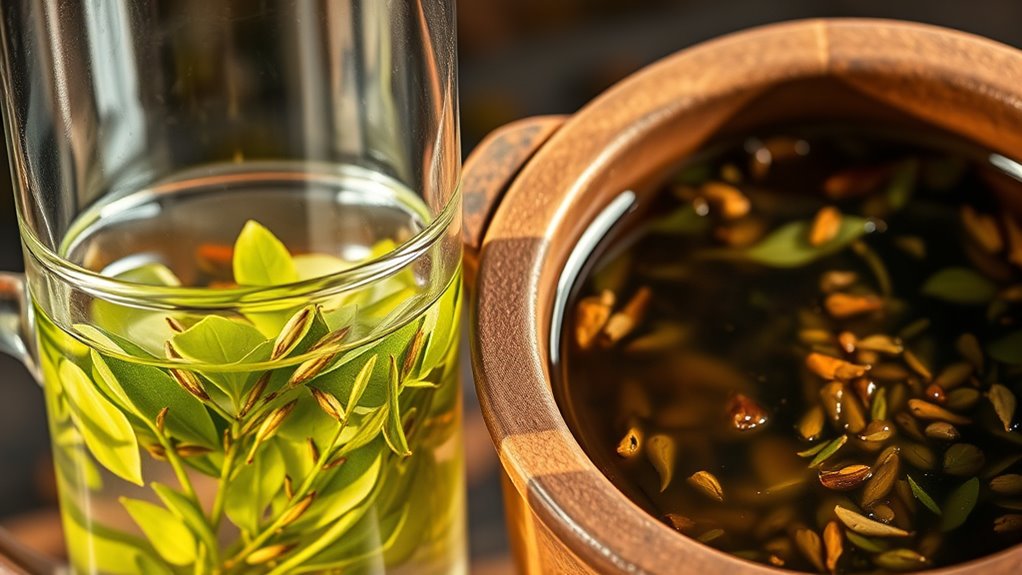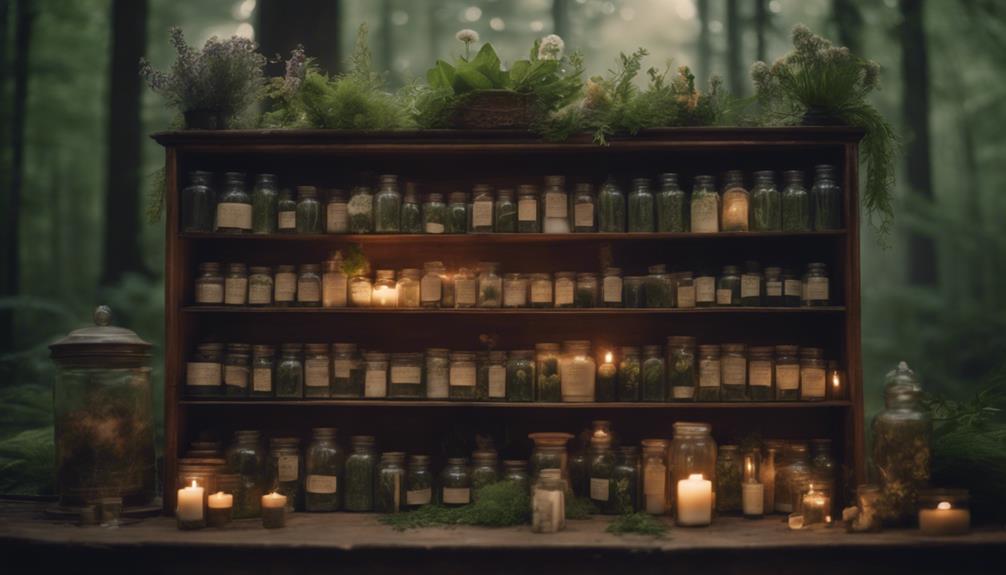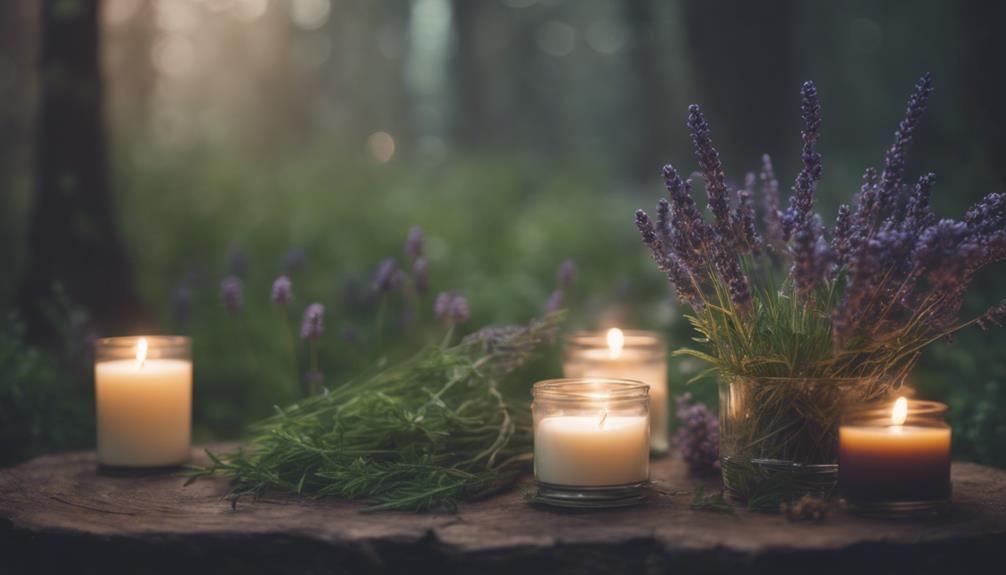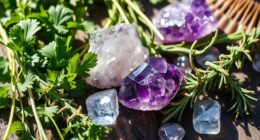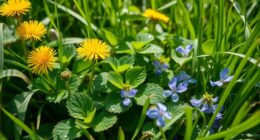To get the most from your herbs, choose infusions for delicate leaves and flowers by steeping them briefly with hot water, while tougher parts like roots and bark require decoctions with longer simmering. Proper preparation, timing, and storage are key to maximizing potency and flavor. Avoid common mistakes like over or under-steeping, using old herbs, or rushing the process. Keep learning to master every step for vibrant, effective herbal remedies.
Key Takeaways
- Choose infusions for delicate herbs like leaves and flowers; use decoctions for roots, bark, and dense plant parts requiring boiling.
- Infusions steep gently for 5-15 minutes, while decoctions simmer for 20-45 minutes to extract medicinal compounds effectively.
- Rinse herbs thoroughly and store decoctions in airtight, dark containers to preserve potency and prevent oxidation.
- Enhance flavor with natural sweeteners or citrus without compromising medicinal properties; consume preparations promptly for maximum benefits.
- Proper handling, timing, and storage are essential to maximize herbal efficacy and therapeutic effects.
Understanding the Basics of Herbal Extraction Methods
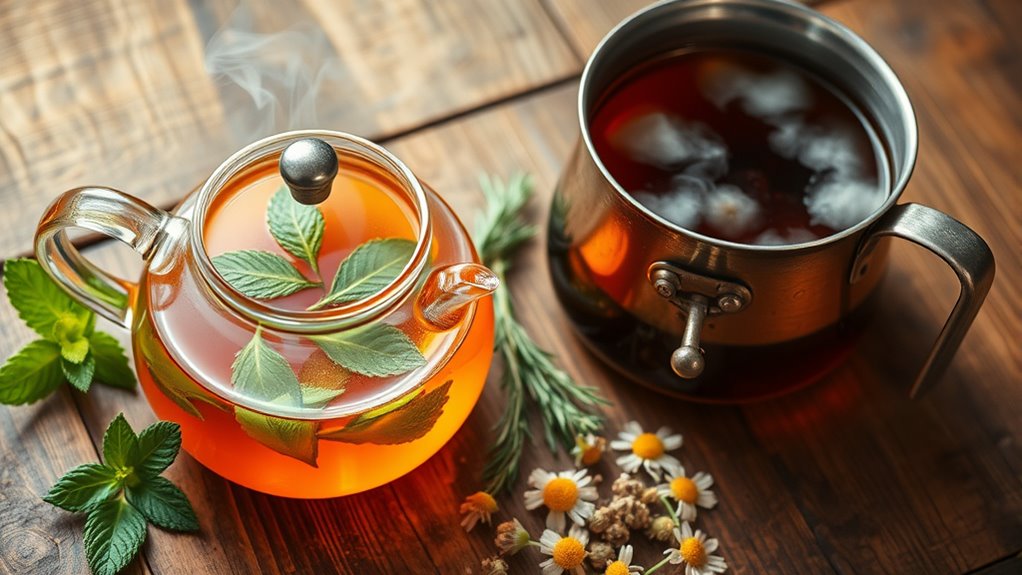
Herbal extraction methods are essential for revealing the active compounds in plants, making their benefits more accessible. When you extract herbs, you’re separating the useful chemicals—like alkaloids, flavonoids, and essential oils—from plant material. This process concentrates the beneficial properties, allowing you to use smaller amounts for medicinal or therapeutic purposes. Extraction methods vary depending on the herb and desired compounds. Some techniques involve simply soaking herbs in hot water or alcohol, while others require more complex processes like distillation or percolation. The goal is to efficiently extract the active ingredients without damaging their efficacy. Understanding these basics helps you choose the right method for your herbal preparations, ensuring you get the most potent and effective extracts from your plants.
Differences Between Infusions and Decoctions
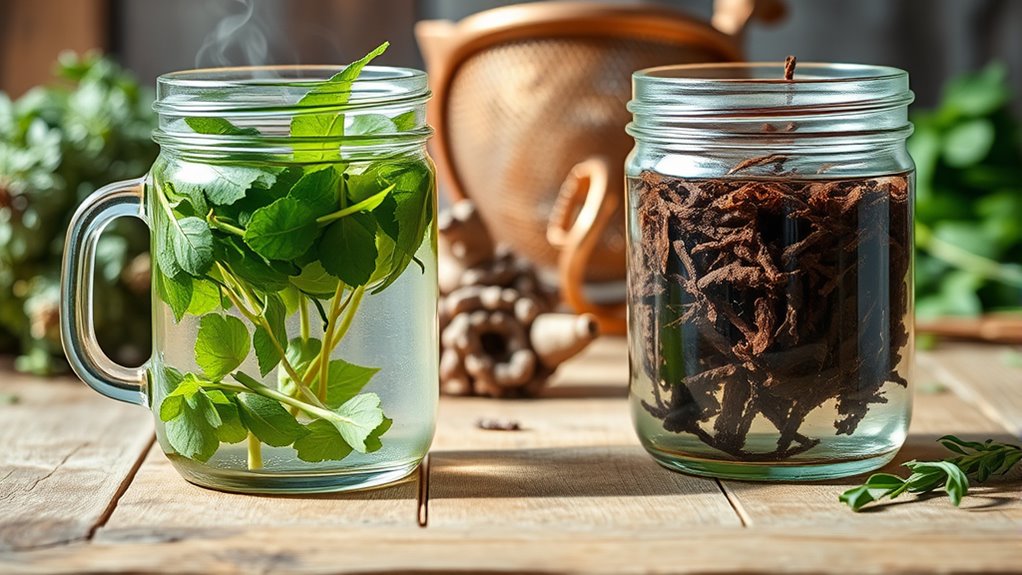
You’ll notice that infusions and decoctions use different extraction methods, affecting how they release active compounds. Infusions are ideal for delicate herbs that release their benefits quickly, while decoctions suit tougher roots and barks that need longer boiling. Knowing which method works best depends on the type of herb you’re working with.
Extraction Methods Differ
The primary difference between infusions and decoctions lies in their extraction methods, which determine how they draw out active compounds from herbs. Infusions involve pouring hot water over delicate plant parts like leaves or flowers and steeping briefly, preserving volatile compounds. Decoctions, however, boil tougher parts like roots or bark for an extended period, extracting more stubborn constituents.
| Method | Suitable for | Extraction Focus |
|---|---|---|
| Infusion | Leaves, flowers, herbs | Delicate, volatile oils |
| Decoction | Roots, bark, hard plant parts | Tough, dense compounds |
Understanding these differences helps you choose the right method to maximize herb potency and benefits.
Suitable Herb Types
Choosing the right extraction method depends largely on the type of herb you’re working with. Infusions work best for delicate herbs like flowers, leaves, and soft plant parts, which release their beneficial compounds quickly with gentle heat or even just hot water. Decoctions suit tougher herbs such as roots, barks, and seeds, which require prolonged boiling to extract their nutrients fully. If you’re dealing with fragile herbs or delicate leaves, an infusion preserves their potency and flavor. Conversely, for dense, woody herbs, decoctions ensure you get the most out of their tougher fibers. Understanding these differences helps you select the appropriate method, maximizing the herbal benefits and avoiding unnecessary extraction time or damage to delicate herbs.
Herbs Best Suited for Infusions

You’ll find that delicate leaf herbs, like mint and chamomile, release their flavors best through infusions. Fragrant flower blends, such as roses and lavender, also thrive with gentle steeping. These herbs create soothing herbal teas that highlight their subtle aromas and tastes effectively.
Delicate Leaf Herbs
Delicate leaf herbs lend themselves perfectly to infusions because their subtle flavors and fragile structures require gentle extraction. You want to preserve their delicate aroma and nuanced taste, which can be lost with harsh heat or prolonged steeping. Using hot or even lukewarm water helps draw out their gentle properties without damaging their fragile leaves. Herbs like mint, lemon balm, and basil are ideal choices. When preparing, keep the steeping time brief—usually around 5 to 10 minutes—to avoid over-extracting bitter compounds. Straining is essential to prevent tiny leaf particles from muddling the infusion’s clarity. By handling these herbs carefully and using gentle heat, you maximize their aromatic and therapeutic qualities, ensuring a fresh, vibrant infusion every time.
Fragrant Flower Blends
Fragrant flower blends are especially well-suited for infusions because their delicate aromas and subtle flavors can be gently extracted without overwhelming their natural essence. When you prepare an infusion with flowers like chamomile, jasmine, or lavender, you preserve their nuanced scents and gentle tastes. Using hot water at the right temperature allows these fragile petals to release their fragrance without becoming bitter or overly concentrated. Infusing for about 5 to 10 minutes is usually enough to capture their full aromatic profile. These blends create light, fragrant beverages perfect for relaxing or enhancing your mood. Because flowers are so delicate, infusions let you enjoy their subtle beauty without the risk of overpowering flavors, making them ideal for a gentle, aromatic experience.
Soothing Herbal Teas
Herbal infusions are a popular choice for creating soothing teas that promote relaxation and well-being. When selecting herbs for infusions, focus on those known for calming effects and gentle flavors. These herbs release their subtle properties best through steeping in hot water without boiling. Consider using:
- Chamomile: Widely recognized for its calming effects and ability to ease anxiety.
- Lavender: Offers a floral aroma that promotes relaxation and reduces stress.
- Lemon balm: Known to improve mood and relieve nervous tension.
These herbs are gentle yet effective, making them perfect for creating comforting teas. By choosing herbs suited for infusions, you ensure you extract their delicate flavors and soothing properties efficiently, fostering a tranquil tea-drinking experience.
Herbs Best Suited for Decoctions
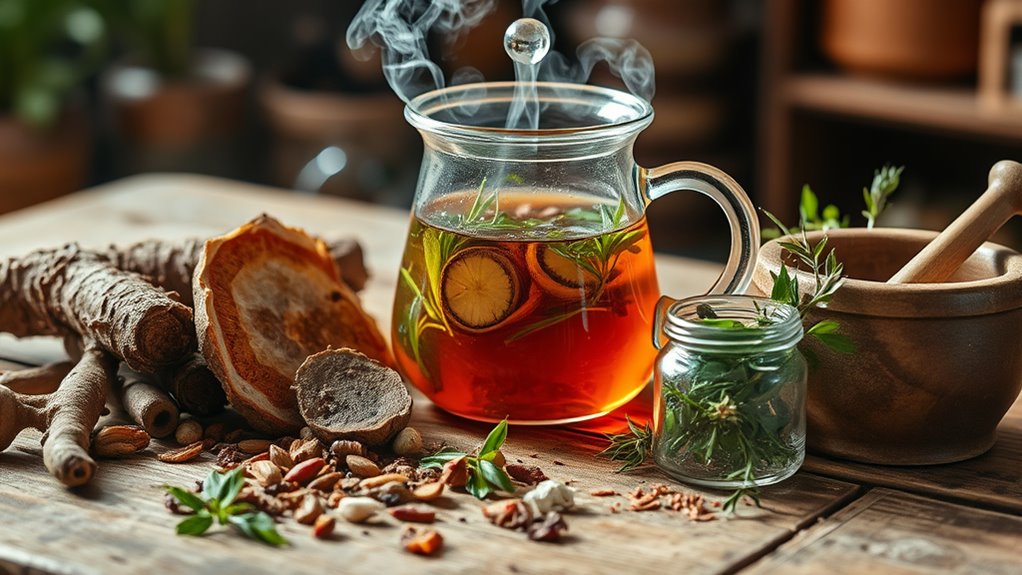
Decoctions are especially effective for extracting the potent compounds from tough, woody, or dense herbs that require prolonged simmering. These herbs often contain resilient plant materials that don’t release their active ingredients easily through quick steeping. Herbs like roots, barks, and thick stems benefit most from decoction methods. They need sustained heat to break down cell walls and release their medicinal properties. Here’s a quick look at some common herbs suited for decoctions:
| Herb Type | Example |
|---|---|
| Roots | Ginger, Licorice |
| Barks | Cinnamon, Willow Bark |
| Thick Stems | Echinacea, Astragalus |
| Hard Seeds | Sarsaparilla |
| Dense Leaves | Dandelion Root |
Using decoctions ensures you get the full therapeutic potential from these tough herbs.
Step-by-Step Techniques for Making Infusions
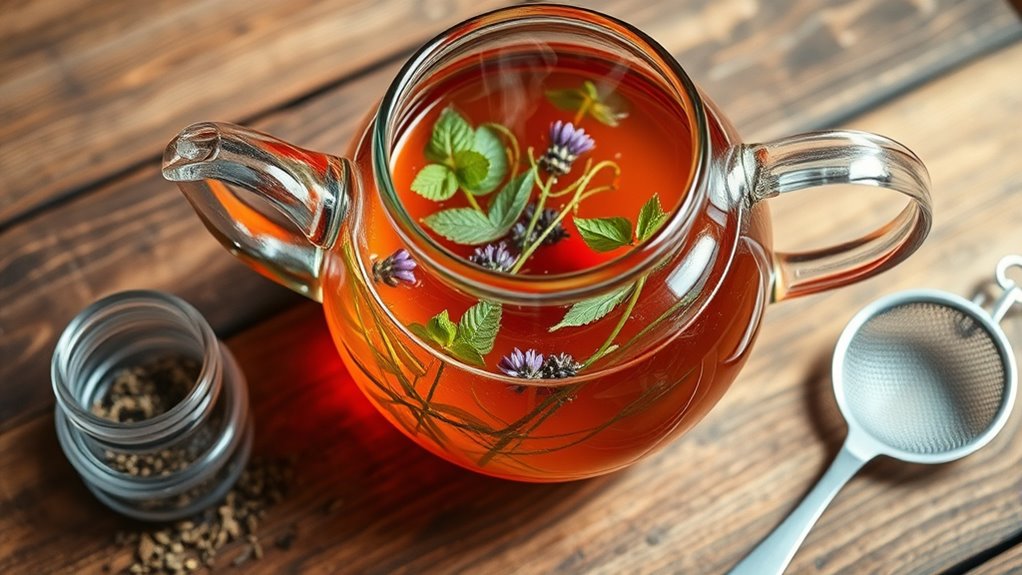
Making infusions is a simple and efficient way to extract delicate flavors and gentle medicinal compounds from herbs. To start, choose fresh or dried herbs and place them in a heatproof container. Pour boiling water over the herbs, ensuring they’re fully submerged. Cover the container to trap heat and aromatics. Let the mixture steep for 5-15 minutes, depending on the herb’s strength and desired flavor. After steeping, strain out the herbs using a fine mesh or cheesecloth. For enhanced flavor, you can add honey or lemon after straining. Remember, infusions are best suited for delicate leaves and flowers that release their essence quickly.
Making herbal infusions is quick and simple—just steep fresh or dried herbs in boiling water for 5-15 minutes.
- Use fresh herbs for brighter flavors
- Steep for 5-15 minutes, depending on herb
- Cover during steeping to preserve aroma
Step-by-Step Techniques for Preparing Decoctions
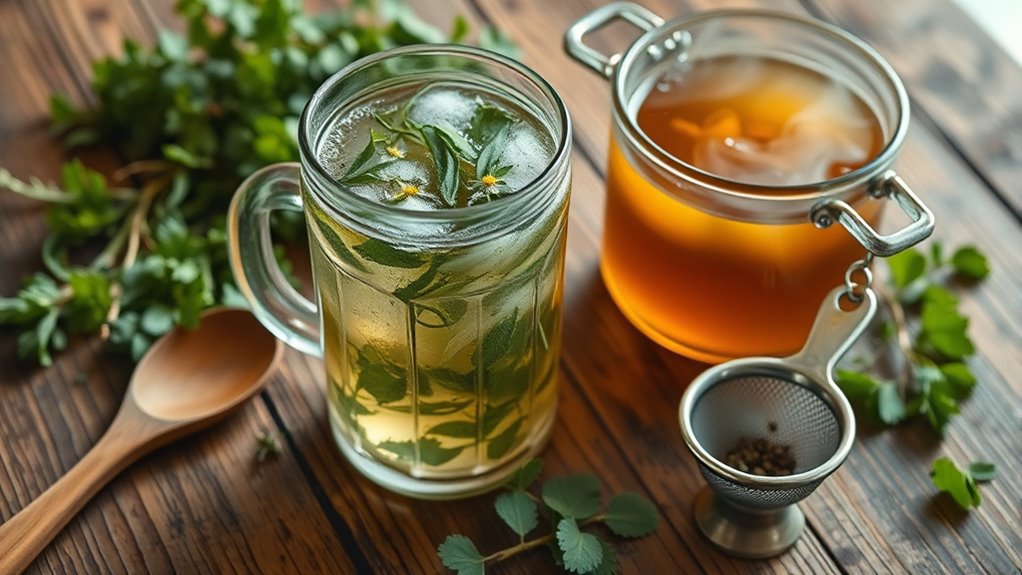
To prepare a decoction, start by selecting sturdy roots, bark, or thick plant materials that require prolonged boiling to release their active compounds. Rinse the herbs thoroughly to remove dirt and impurities. Place the herbs in a pot and add cold water, ensuring the liquid covers them completely. Bring the mixture to a boil over medium heat. Once boiling, reduce the heat to low and let it simmer gently. Keep the lid partially on to prevent evaporation while allowing steam to escape. Simmer for 20 to 45 minutes, depending on the herb’s toughness. Stir occasionally to prevent sticking. After simmering, strain the liquid through a fine mesh sieve or cloth to separate the plant material from the decoction. Let it cool before use or storage.
Tips for Enhancing Herb Potency and Flavor
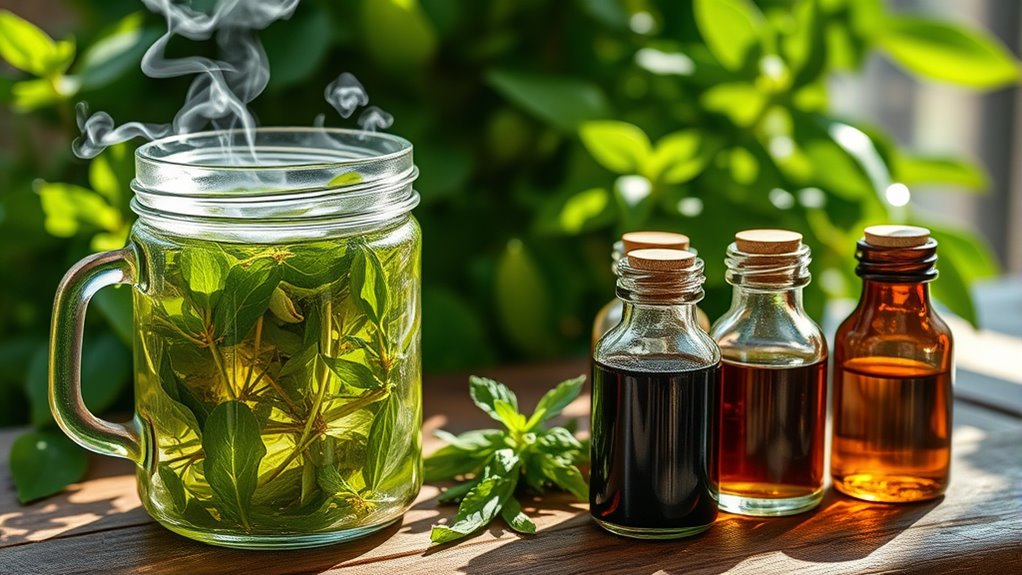
Enhancing the potency and flavor of your herbs begins with proper handling during and after the decoction process. To maximize benefits, consider these tips:
- Use fresh or properly dried herbs to preserve essential oils and active compounds.
- Avoid overboiling, which can degrade delicate flavors and active ingredients. Instead, simmer gently to extract maximum potency.
- Store your decoctions in airtight, dark containers to prevent oxidation and preserve freshness over time.
Additionally, adding a small amount of natural sweetener or citrus can enhance flavor without compromising medicinal qualities. Proper timing—like drinking your decoction soon after preparation—also guarantees potency remains high. Following these practices helps you get the most out of your herbs’ therapeutic and sensory qualities.
Common Mistakes to Avoid When Preparing Herbal Remedies
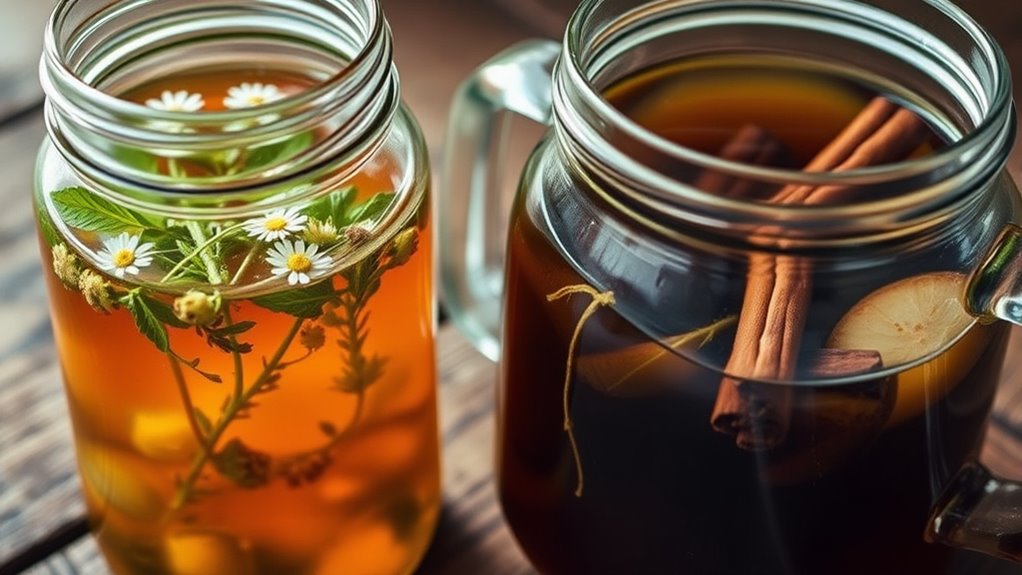
One common mistake is using incorrect herb proportions, which can lead to weak remedies or unwanted side effects. If you put too little herb, your infusion or decoction won’t be potent enough to be effective. Conversely, using too much can cause bitterness or even toxicity. Always measure herbs carefully and follow trusted recipes or guidelines. Another mistake is over- or under-steeping herbs; steeping too long may release bitter compounds, while too short might not extract enough medicinal properties. Also, avoid starting with stale or old herbs, as their potency diminishes over time. Rushing the process or not paying attention to water temperature can also diminish effectiveness. By avoiding these mistakes, you ensure your herbal remedies are safe, potent, and effective.
Frequently Asked Questions
How Do Herbal Extraction Methods Affect Nutrient Preservation?
Herbal extraction methods markedly impact nutrient preservation by influencing heat, time, and solvent use. For example, infusions gently extract delicate compounds with hot water, preserving vitamins and volatile oils. Decoctions, which involve boiling herbs longer, can degrade sensitive nutrients but extract tougher plant materials effectively. By choosing the right method for your herbs, you maximize nutrient retention, ensuring you get the full health benefits from your herbal preparations.
Can Infusions or Decoctions Be Combined for Better Benefits?
Think of combining infusions and decoctions like blending a gentle stream with a bubbling hot spring—you get a richer, more balanced herbal extract. Yes, you can mix them to harness the delicate nutrients from infusions and the robust compounds from decoctions. This approach maximizes benefits, especially for complex ailments. Just remember to adjust steeping times to protect sensitive nutrients and optimize extraction.
How Long Do Herbal Infusions and Decoctions Typically Last?
Herbal infusions typically last 24 to 48 hours when stored in the refrigerator, while decoctions are best consumed within 24 hours. To guarantee potency and safety, you should store infusions in airtight containers and keep them chilled. Decoctions, being more concentrated, lose their strength faster and should be consumed promptly. Always smell and taste your herbal drinks before use to check for freshness.
Are There Safety Concerns With Certain Herbs in Infusions or Decoctions?
Yes, there are safety concerns with certain herbs in infusions or decoctions. Some herbs can cause allergic reactions, interact with medications, or be toxic if used improperly. Always research herbs thoroughly and consult a healthcare professional before use, especially if you’re pregnant, nursing, or on medication. Avoid herbs with known adverse effects, and follow recommended dosages to guarantee safe and effective herbal preparations.
What Equipment Is Essential for Precise Herbal Extraction Techniques?
You need a few essential tools for precise herbal extraction: a quality stainless steel or glass pot to prevent contamination, a accurate thermometer to control temperature, a fine mesh strainer or cheesecloth to filter out plant material, and a digital scale for precise measurements. You also benefit from a timer to track steeping times and a glass jar for storage, ensuring consistency and effectiveness in your herbal preparations.
Conclusion
Now that you know the dance between infusions and decoctions, you hold the keys to revealing nature’s treasures. Like a skilled conductor, you can orchestrate the perfect harmony of flavors and potencies, turning simple herbs into powerful remedies. Trust your hands, embrace the process, and let each sip or sip-like brew be a symphony of wellness. With this knowledge, your herbal journey is set to bloom—rich, vibrant, and entirely in your control.

